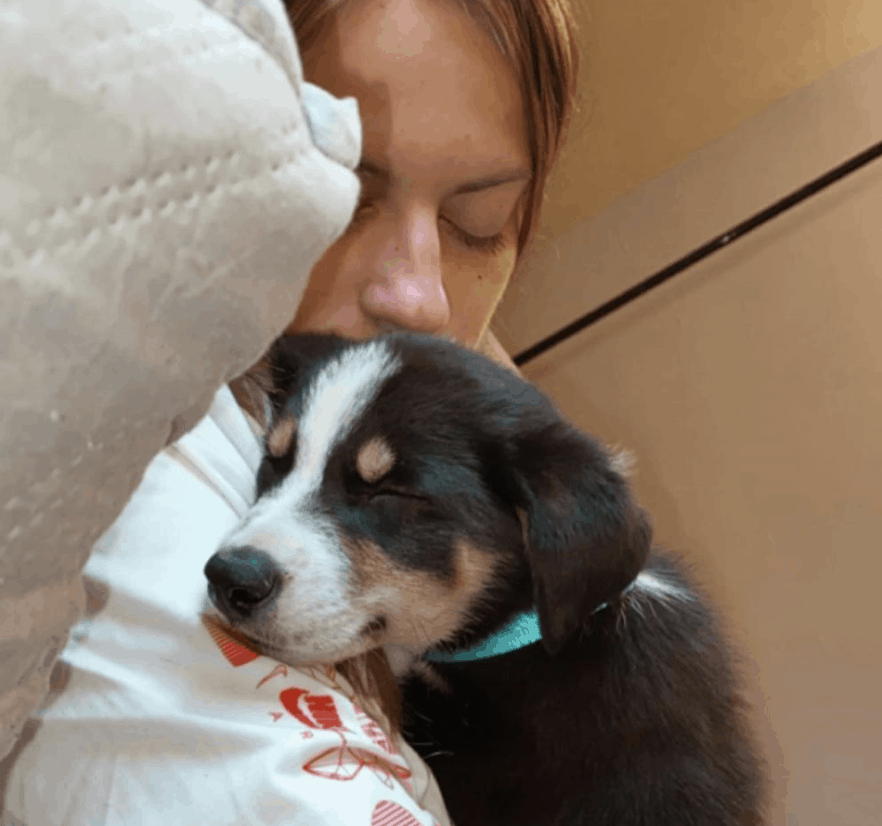As smart as Australian Shepherds are, they need to be properly disciplined. They are emotionally smart dogs, so when discipline is necessary, clear, consistent actions are key.
The idea of punishing your Aussie puppy makes no more sense than the idea of punishing an infant child.
Keep the baby child notion in the back of your head as your puppy grows up. Can you imagine what would happen is anyone spanked a baby? The only thing that spanking would do is make the baby cry, and make the adult feel bad. A small baby will not learn from punishment, and your puppy is no different.
Disciplining your Australian Shepherd pup will form the way that your dog views you for the entire relationship. Everything you do with a small baby is designed to feel loved, protected and close to you, an Aussie puppy is the same way.

Discipline, Don’t Punish.
Punishing your new Australian Shepherd will most likely scare it more than anything else – making it wary of being around you.
If you spank your puppy, even if it’s a light tap, you’re training the puppy to know pain and fear.
Australian Shepherds don’t know “not” to do something. They learn the result of doing. If they do something and the result is positive (a treat, a belly rub etc) the pup will quickly learn to continue the behavior.
The opposite effect is true if they do not receive the reward. For instance, the dog does not understand that it shouldn’t get food off of the counter, it does, however, understand that every time it tries to get on the counter it gets told “no.”
Understand Your Puppy
It is very important to understand that if your puppy is chewing on something (for example), and you punish it (with even a light tap) it will most likely stop what it is doing. Your pup is surprised (and possibly feels pain from the smack) and now it will naturally feel frightened of you. The puppy WILL NOT link the punishment with what it was doing, though, and has no way of predicting when it might be punished next.
Shouting at the puppy can also do damage to your relationship. If you startle the puppy with a shout, it might stop what it’s doing; however, the puppy does not understand the relationship between its actions and you are shouting. Even the angry tone of your voice can cause your puppy to be afraid for a moment.
Using strict punishment on a puppy will not only scare the puppy at the moment but can do damage to your puppy mentally making it afraid of you and even turn the Aussie mean towards you.
Your puppy won’t trust you because it doesn’t understand why you frighten it. This can keep the puppy from ever really warming up to you, and you’ll be unable to have a good relationship as the puppy grows.

Passive and Defeated
Some dogs are very passive and will respond to you in a very defeated way. Your dog might stay in line all the time, solely out of fear, but it won’t ever trust you.
Other dogs have a more stubborn streak, and because they feel threatened by you may attempt to dislodge you as the one in charge. Dogs are pack animals, and if your dog thinks it should be the leader, you might be in for many behavioral problems big and small.
At the very least, you will not have as good a relationship with your dog as you could have.
Just as you would do with a very small child, use gentle correction when your puppy does something he shouldn’t do. Use gentle movements and a kind but firm tone of voice, so that your dog understands to stop without becoming frightened.
Handling Aussie Behavioral Problems The Easy Way
Sometimes, even the best dogs can act out, and if you are dealing with dog behavioral problems, it is best to act as quickly if possible. If bad behavior is allowed to continue, you may end up with a bigger problem on your hands. The good news is, there are many easy ways that you can handle dog behavior issues in a humane and friendly way.
Australian Shepherd behavioral problems can range from cute, but annoying little problems, to full-fledged dangerous issues such as biting.
While there are many causes of behavioral problems, the solutions are fairly simple. The old adage, “You can’t teach an old dog new tricks” simply does not apply here. With consistent training, you can overcome your dogs behavior problems.
Here are some simple and easy to implement dog training tips for your Australian Shepherd.

Be Consistent.
This is the absolute key when training any animal. You may be tempted to let them slide every once in a while, but this will only serve to hamper your efforts. Be consistent with praise as well as with corrections and your dog will begin to understand that you are indeed the master.
Positive Reinforcement is Vital.
While many older dog training techniques, such as choke chains may be initially effective, they may actually cause more problems down the road. Positive reinforcement helps your dog associate good behavior with good rewards is a very effective means of tackling even the toughest dog behavior problems.
In brief, positive reinforcement means that you reward a dog when they do the right thing, and withhold the reward when they do not. Even the most stubborn dog will begin to respond to these training techniques when they are applied consistently.

Introduce a Crate
One of the easiest ways to put an end to destructive behavior is to provide your dog with clear cut boundaries. Crating them while you are gone, or when you need some space is an effective and humane training aid. You may need to introduce them to the crate slowly, and allow them time to get used to being confined. Remember, be consistent and reward them for good behavior in their crate. A crate should not be used as a punishment device, but rather as a safe place for them to go and relax.
Like-minded Training and Discipline
An additional cautionary note for you and especially your immediate family members. Once the dog behavioral problems are addressed, and the corrective training has started, it is imperative everyone involved with the dog use the same training techniques. Everyone must be consistent in the handling of the dog. If not your poor dog will become very confused and make act out even more than before the corrective training was initiated.
Once you have these methods in place, you can easily begin to solve dog behavioral issues without any undue stress to you or your pet. A well-behaved pet is a happy pet and you will appreciate the lack of destructive and potentially harmful dog behavioral problems.


